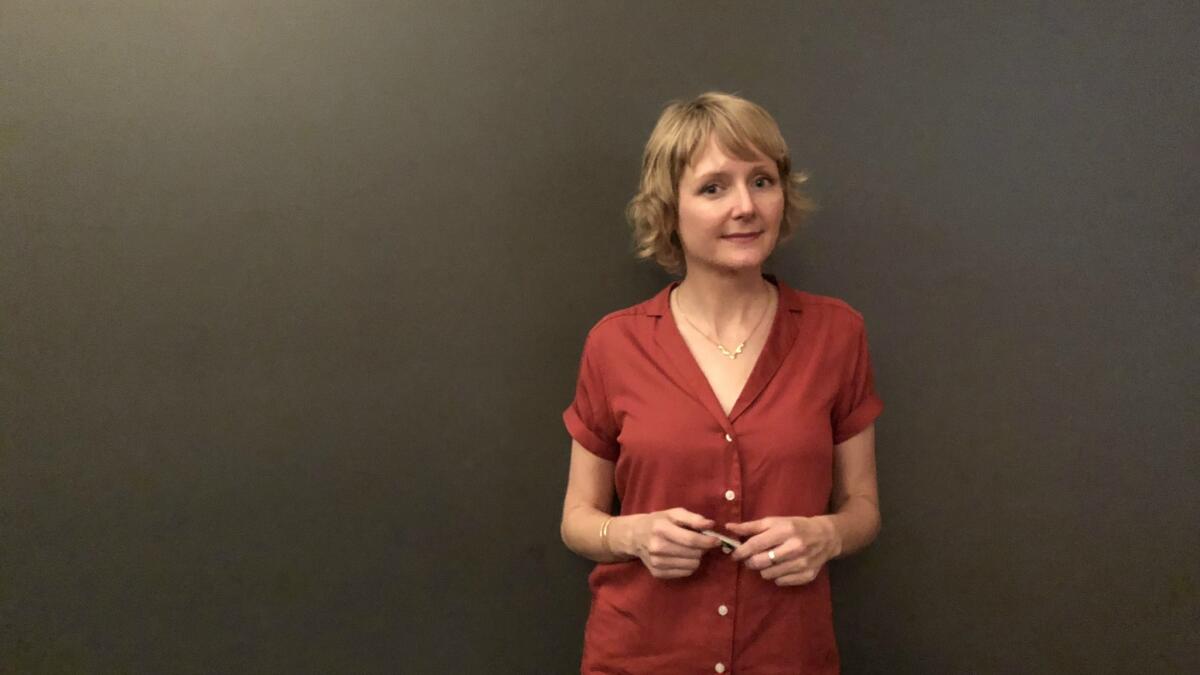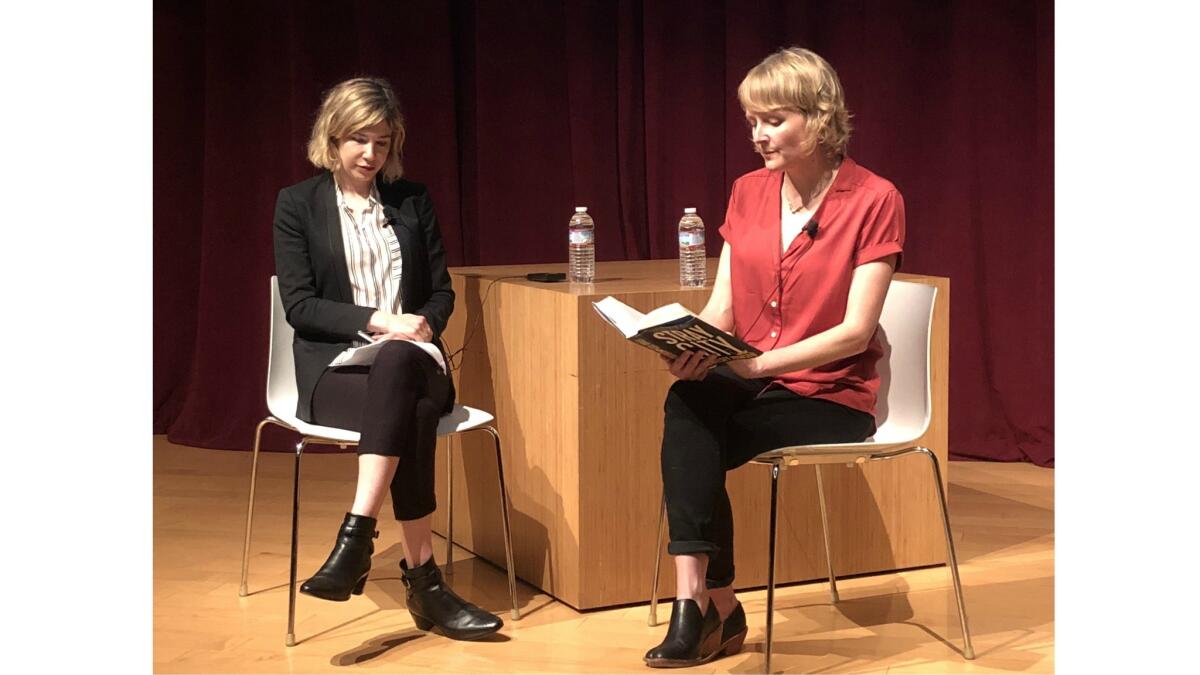Q&A: Chelsey Johnson walks the ‘Stray City’ streets of Portland, Ore., with Carrie Brownstein

Chelsey Johnson still suffers from punk damage. Just ask Carrie Brownstein.
Johnson, who grew up in northern Minnesota before moving to Portland, Ore., in the early aughts, draws on that experience in her debut novel, “Stray City,” which subverts expectations around the coming-out narrative. In Johnson’s book, a young woman leaves the Midwest for Portland’s underground lesbian scene only to find herself pregnant after a drunken one-night-stand with a man. Despite the concerns of her shocked circle of gay friends, she decides to have the baby.
Johnson teaches at the College of William and Mary in Virginia and is a writer on Brownstein’s upcoming television show, “Search and Destroy.” They spoke to The Times before an appearance at the West Hollywood Library to discuss “Stray City.” The conversation has been edited.
You mentioned that at a recent book tour event someone asked about punk damage. What’s “punk damage”?
Chelsey Johnson: Punk damage is when you never get over that stage of hoarding things, even long after you should have outgrown it. In a hotel room you’d grab, like, somebody’s leftover rolls from the room service tray, you know? That’s punk damage.
Carrie Brownstein: I just worked with you. You have the most insane punk damage.
Johnson: It’s true. I have not recovered from my punk damage even though I have a respectable job. I’ll never lose that scarcity mentality, which I think was very characteristic of that scene and that time.
Brownstein: It’s interesting because you grew up middle class. It would make sense of if you grew up with food insecurity or something.
Johnson: Nope, I had everything I needed. But I was financially independent from the minute I finished college. I was not a trust fund kid. I actually think — and I just realized this now — the root of my punk damage is the summer I spent in Portland between my sophomore and junior years in college, when I was 19, because I was totally on my own. My parents gave me no money, and so I sold my plasma for a few weeks ...
Brownstein: Oh, my God.
Johnson: … and ate samples at Safeway for lunch and picked blackberries. They grow everywhere in Portland; they’re a weed. I was, like ,“These are free?!”

Part 2 of “Stray City” is written in epistolary form. How did you conceive of the structure?
Johnson: I’d been writing the book for seven years and finally had a super polished draft that was, like, 500 pages. I sent it to my agent, who said, “I really love this book. I really love Part 1 and Part 3, but let’s talk about Part 2.” I was, like, ‘Is it too long and slow and boring?’” [Laughs.]
I really didn’t want to write a book that people put down halfway through. Part 2 was exactly the kind of thing that people put down. It was somebody wandering around and thinking a lot for 150 pages. So I thought: What if I just distill it down to calls and postcards and emails and answering machine messages? They were already in there. I just cut everything except for the epistolary stuff. It was so fun. Just trashing 35,000 words.
Brownstein: Jesus.
Does that sound painful to you, Carrie?
Brownstein: It also sounds freeing but, yeah, both. I’m not very precious about things — editing is such a crucial part of the writing process — but that’s a lot of words. Because there’s some part when you’re writing a book where you’re just thinking in terms of volume, like, “I did it. Thank God. I got that 600 pages, they must all be great!”
Did that decision change your approach to other sections?
Johnson: I kept doing those kinds of forms: the immigration questions test, what a characters is Googling, her search history. It did free me up to insert more of those things. They make the book move more quickly, and as someone who reads all the time, I’m always so grateful when a book just moves at a good clip.
There’s a short chapter in which you provide an excerpt from the so-called Lesbian Mafia Official …. List [of hated things]. Since it’s an excerpt, what else on the list didn’t make it into the book?
Johnson: That’s a good question! The list could be huge. I was trying to think of things that weren’t too obvious. What else did we hate?
Brownstein: “Kissing Jessica Stein.”
Johnson: Yes! It’s really a straight movie. It’s by and for straight women. In that era, in a lot of ways, your taste was defined by what you were against. So maybe I even need to go little broader. Like, The Man. Nestlé Corporation. Shell Oil. The WTO. Political stuff.
Do people define themselves less by what they’re against now?
Johnson: Not just the lesbian mafia, but the whole counterculture. Selling a song to a commercial. Signing to a major label. Selling out.
Brownstein: That concept doesn’t really exist anymore.
Johnson: I teach college students and I try to explain the concept of selling out and they’re, like, “What’s that?” But it was a huge concern and it plagued me as I wrote the book. Am I selling out my community by exposing these things? I had this little invisible army of Facebook commenters looking over my shoulder while I wrote. I was, like, “They’re going to hate this. People are going to tear this apart. They’re going to call it heteronormative or homonormative or whatever.”
In “Stray City” queer identity is the norm and heterosexuality is deviant. Did you set out to write a novel that flipped the script?
Johnson: Yes. That was really the intent. It came to me because I was writing that section we discussed that later got cut. I had a character, Ryan, and I decided to have him leave behind his pregnant girlfriend. I thought it would be so much more interesting if the pregnant girlfriend that he left behind was a lesbian. I don’t think I’d ever really written anything about my peers. I’d written a lot of short stories and some of them had gay characters, but it would be gay men, nobody who is like me. It was my first time trying to write about my world and my community and I took a funny back door into it.
So I knew she’d gotten pregnant and had a thing with this guy, and I wanted to show — at least in my experience of that community — how completely strange that would be. When we’re talking about “Chasing Amy” or “Kissing Jessica Stein,” the script that we’d seen at that point was that homosexuality was something you dabbled in or were just entering into. Here, I wanted heterosexuality to be the weird thing you dabble in: how out of character, how off-brand, how strange and repulsive. We will disown you if you do it! I don’t think straight people are used to being the repulsive side of things. They’re not used to being the demonized or othered.
There’s also the incredibly hard work it takes to come out to your family. For some parents it’s, like, “Maybe this is just a phase?” And I thought, oh my God, what would it be like to try to tell your mom, “I’m actually with a guy now” and not have it completely negate everything you are.
You were a longtime volunteer for the Rock n’ Roll Camp for Girls, and you call yourself a “recovering karaoke junkie.” How does music inform your writing?
Johnson: There’s so much music in the book. People play it, they listen to it. It’s like a soundtrack. I really love music — I have played guitar, badly — but I really love music as a live thing, as a gathering place for people. And I love reading music criticism. The way that it can explain things in the culture, parsing what a song is doing in a way that’s thought-provoking and political. That seeps into the book too. I can’t really separate music and writing because they’re so much a part of my sensibility and my community; they were also so much a part of that scene. Even people who had no skill, it was just something you did: you would just form a band and play, like, two shows ever. It didn’t matter if you were good, it was just fun.
How do you two know each other?
Brownstein: I think you interviewed my band for Out magazine.
Johnson: I did! We ran in a music crowd.
So you’re old friends?
Brownstein: Almost 20 years now.
Johnson: 20 years? But we’re only, like, 25 years old.
Brownstein: I know, so it’s weird. We’ve know each other since preschool.
Chelsea Johnson will appear at the Los Angeles Times Festival of Books on April 21 at 11 a.m. on the panel “Fiction: Coming of Age” with Jonathan Evison (“Lawn Boy”) and Jenny Zhang (“Sour Heart”), moderated by Mark Haskell Smith.
More to Read
Sign up for our Book Club newsletter
Get the latest news, events and more from the Los Angeles Times Book Club, and help us get L.A. reading and talking.
You may occasionally receive promotional content from the Los Angeles Times.







